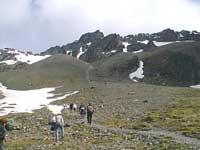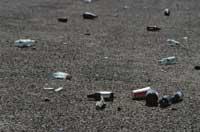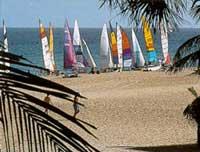What is economics or ecology?

The latest tourism surveys have highlighted the growing population influx. The ‘trip’ is an attractive and pleasant product for travelers, but dangerous for people who visit it. Travelers are not always so clean and the new spaces they visit many times also know how to become landfills.
Many mountaineers hear that Everest has become an imposing landfill: its ports are full of food boats, plastic drums or shops. On Mount Collado, south of the Himalayas, more than 2000 bottles of oxygen have been collected.
But years ago the mountaineers began to dirty the top and slopes. The Government of Nepal, starting in 1993, adopted a series of measures to improve the order of the mountains: in addition to organizing clean-up expeditions, fines of 4,000 dollars began to be imposed, which remain in the same line. Since then, many mountaineers have paid the Sherpes for their garbage to go down to the village, because it is cheaper than paying the fine of the Nepalese government.

However, polluting tourism is not only detected among visitors to the mountains, but the same happens with the jump to the coast. Many hikers come, for example, to small islands in Brittany (France). It is noteworthy the case of the Ponante islands, in which agriculture and fishing are completely disappearing in recent years due to tourism. Tourism has greatly transformed the real estate market and expensive homes have been built in every corner. Waste disposal and scarcity of drinking water have become a serious problem. The villages of these islands, for their part, have had to restructure their public facilities (electric transformers, roads and roads...) so that tourists feel comfortable, but all this affects the environment.
Today, travelers have a predilection to go anywhere in the world; the further away the destination, the more attractive it seems. Antarctica is a clear example: every year more than 15,000 visitors pass through this cape. However, these visitors do not abandon them as when they arrived. Apparently,
tourists who come to the place, in addition to carrying cameras and video, also carry bacteria in their shoe soles. Tourist footwear, therefore, is putting our ecosystem in serious danger. To prevent this ecological catastrophe from producing more disastrous effects, Freemantle doctor Chris Curry (Australia) and his team force tourists to use an effective disinfectant. Any visitor who comes to Antarctica should buy this product. But how can you control if all tourists have clean shoes? At the moment, to avoid infectious diseases or laughter, scientists have asked those responsible for travel agencies to control the shoes of all their customers.

Tourism not only pollutes the surface but also livestock. For example, in the Chobe National Park in Botswana (Africa), two epidemics have appeared in the mangostes that live there. In the Kalahari desert of the same state a third epidemic has also appeared that has damaged the suffering. Mongooses get sick eating the polluting waste left by tourists in the park. Kathleen Alexander, responsible for the fauna of Botswana, says that humans are responsible for these epidemics, since until now a tuberculosis animal has never been seen.
The importance of the economy...
We know that tourism moves a lot of money. On many occasions, the economy abandons ecology or the environment and only defends its interests. In the case of trips to Everest, the organizers of the expeditions mainly take into account the purses of the mountaineers and not their ecological awareness and/or physical capacity.

On the other hand, much of the Pyrenean population lives thanks to the ‘green tourism’ that has become fashionable in recent years. Although the damage this new way of travel causes in nature is evident, at the present time it remains.
The case of African national parks is the same: ecotourism is a source of income for its inhabitants, who annually raise 1.5 million dollars per park. Although travelers harm some animals living in it, Africans intend to continue this type of tourism.
Due to the damage tourism entails in recent years, numerous meetings and debates have been organized. But even though decisions have been made at these meetings, few governments have complied with tourism limitation measures. Who will win the war between economy and nature?
Published in 7K.
Buletina
Bidali zure helbide elektronikoa eta jaso asteroko buletina zure sarrera-ontzian











